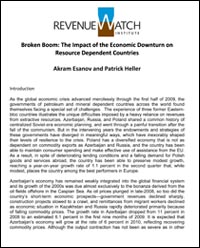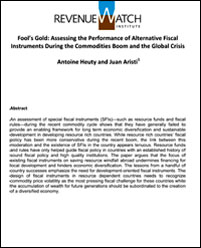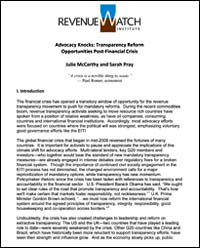
Boom, Bust and Better Policy: Crisis Lessons for Resource Rich Countries
The global economic downturn and the subsequent drop in commodity prices hit resource rich countries especially hard. In some countries, the shock has caused lasting harm, while for others diversification and prudent policies seem to have lessened the negative impacts.
The Revenue Watch Institute has developed a set of recommendations on how resource rich countries can shield themselves from boom/bust cycles, drawing lessons from the recent crisis and the Millennium commodities boom that preceded it.
In "Boom, Bust and Better Policy," Revenue Watch staff and other experts analyze the economic, social and political implications of the crisis, providing an in-depth assessment of economic reforms designed to weather price volatility. The resulting recommendations are designed to guide governments, policymakers and advocates in the current climate and future volatility.
I. Broken Boom: The first paper in the series is based on a new study of 80 economies by Revenue Watch senior economist Akram Esanov and legal advisor Patrick Heller. The authors demonstrate that resource rich countries suffered sharper volatility than resource poor countries during the latest boom/bust cycle, and examine the policy choices that impacted country performance. Selected recommendations include:
Create policies that enable economic diversification. Prudent macroeconomic policies helped some resource-dependent countries mitigate the immediate effects of the global recession, but governments must create an enabling environment for economic diversification if they want to reduce vulnerability over the long term.
• Act fast, but plan ahead. Governments must align short-term recovery measures with long-term development strategies and improved financial sector regulations if they hope to avoid the worst effects of future downturns.
• Good governance protects national economies from global crises. Resource rich countries that are integrated into global markets should improve financial sector oversight, corporate transparency and governance, to secure themselves from external and international economic shocks.
II. Fool's Gold: In the second paper, Revenue Watch deputy director Antoine Heuty and analyst Juan Aristi examine the recent performance of special fiscal instruments—such as resource funds and fiscal rules, and find that these tools have generally failed to provide a framework for long-term diversification or sustainable development in resource rich countries. Selected recommendations include:
• Stability does not guarantee sustainability. Although protections against volatility are necessary for long-term growth, resource rich countries should not seek stability at the expense of sustainable development. Policy-makers must articulate long-term development goals to diversify economies and align annual budgets with multi-year fiscal frameworks.
• Invest domestically to help foster diversification. There is value in investing resource windfalls abroad to insulate the domestic economy, but countries must balance this opportunity against higher transaction costs and increased exposure to external shocks. A combination of an explicit stabilization strategy, better policy coordination and domestic investment planning will help governments to support local development and foster economic diversification.
• Manage non-resource wealth effectively. Resource-dependent governments should maintain fiscal balance in non-resource sectors. Countries will achieve greater independence from resource revenues if they set specific targets and timelines for the reduction of non-resource deficits.
III. Advocacy Knocks: The devastation wrought by the global economic crisis has drawn new international attention to the importance of extractive sector transparency. In the third paper, former Publish What You Pay US coordinator Sarah Pray and Revenue Watch advisor Julie McCarthy highlight the moment of opportunity the crisis has created for local and international transparency advocates seeking to promote new levels of accountability in resource rich countries. Selected recommendations include:
• Better accounting standards and stock listing requirements will lead to greater accountability. Activists should rally to the global campaign for modernized international accounting rules and laws directing companies on public stock exchanges to report extractive industry payments on a country-by-country basis. Both houses of the U.S. Congress, for example, have drafted legislation that would update listing requirements to include company disclosures "disaggregated" by country.
• Demand strict extractive industry terms in international loans. Activists should meet with representatives from International Financial Institutions and national finance ministries to demand that extractive sector transparency conditions are included in their countries’ loan agreements.
• When transparency practices are universal, citizens get a better deal. Without a level playing field of information access and oversight capacity, it is significantly more difficult to maximize tools of transparency and accountability for the public good. Standards for transparency should be promoted for adoption by both governments and extractive companies to ensure accountability to citizens and shareholders alike.
In forthcoming Revenue Watch papers, legal advisors Matt Genasci and Patrick Heller will scrutinize the deals between companies and governments and the influence of legal frameworks and extractive contracts on the value that nations derive from the extractive sector; and Juan Carlos Quiroz will assess the influence of company risk profiles and operational priorities on the petroleum industry during the crisis.


